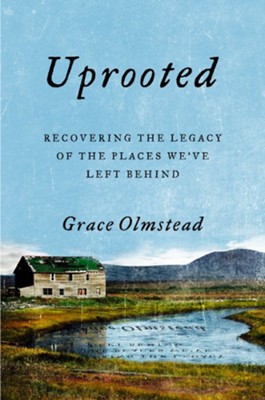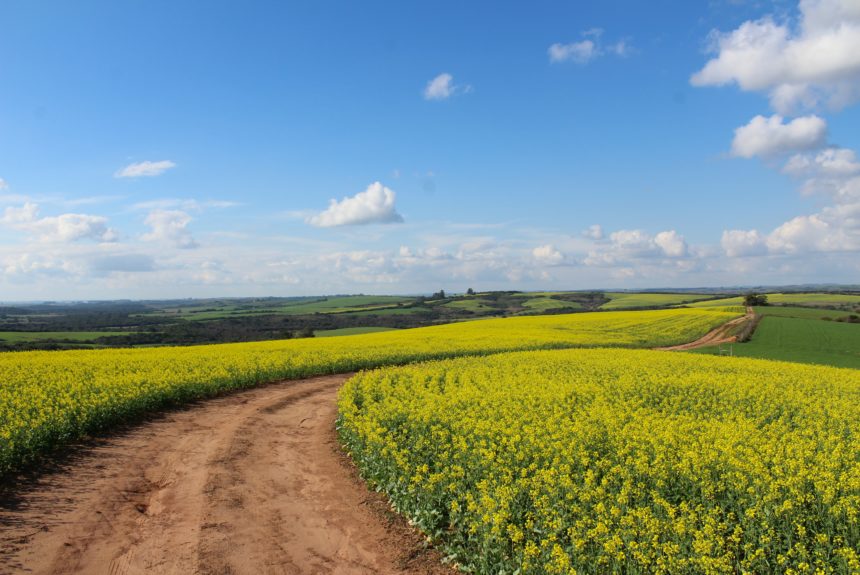By Ericka Andersen
Do our hometown roots matter? How does the uprooting of American lives for cross-country, big city dreams affect the land, the climate, and the region? How much do our personal decisions influence the world at large?
Grace Olmstead left her hometown of Emmett, Idaho to attend college in Virginia. More than a decade later, she’s a married mother of three still living across the country from the rural community she adored growing up. That displacement has guided her writing and ideology on the importance of localism, rootedness and responsibility to place.
In her new book, Uprooted: Recovering the Legacy of the Places We’ve Left Behind, she investigates the consequences of decaying small towns like her own and what it means when people leave and never come back.
Rural small towns are some of the most likely to lose their most gifted and talented citizens to “brain drain,” a phenomenon where the best and most intelligent individuals leave for bigger cities and more professional opportunity.
You see it in the movies, where the hero is encouraged to “get out of this town,” to go make something of their life. Staying is often seen as a failure, practiced only by those with no other options. This stereotype is helping to kill off small towns, creating an assumption of failure for those who stay. The loss to the local economy and community is devastating.
For those who care about protecting the environment and reducing the effects of climate change, the economic piece is worth a closer look. As energy economist Nick Loris wrote in a recent C3 Solutions policy paper, economic freedom and possibility are keys to protecting the environment, both locally and regionally. These factors are “critical to improving the environment and reducing the risks of global climate change,” wrote Loris.
Nothing exists in a silo. Without resources for entrepreneurial farmers and small business owners, there are few options—or incentives—for people who want to stay in their original communities. There is little margin to allow for the time, talent and care that land and community require to plant, develop and thrive. There is less respect for the slow process of growth and for the necessary wisdom that comes with time, familiarity and deep love for the land.
Uprooted argues that our hometowns deserve better. They deserve the second thought that young people neglect to give them when they leave home for school, jobs, relationships and escape. Part of the problem is Western society, which fetishizes toxic individualism over communal well-being. Children grow up dreaming of personal fulfillment, without regard for community wholeness and societal health. But there is room for both.
As Olmstead notes, the ability to leave and thrive has delivered a country filled with American success stories. “The American Dream,” she writes, “ is, in essence, about economic and class transience: the ability to move from poverty to wealth, from lack to abundance.” Do we, however, exploit the benefits of transience at the expense of rootedness?
Exploration and travel in young adult years isn’t inherently negative, but the consequences of permanent displacement are wreaking havoc on American farms, small towns, local environments and ultimately, the country’s economy, production and humanity at large.
When people leave for good, they no longer maintain the “shared roots” that cultivate a thriving community and local economy. “We no longer appreciate our past ecology,” writes Olmstead. “We no longer have a healthy, self-sufficient local economy. We no longer share the seasons of feasting and harvesting that offer membership and meaning to this landscape.” (p.12)
Leaving without a second thought leads to what she calls “extraction and exploitation,” contributing to the ultimate decay of place. Any place or project requires roots to cultivate development and a commitment to see it through. People are often so focused on getting out, their concern for the environment is also neglected. “It’s easy to think the soil can last forever if you know nothing of it,” writes Olmstead.
The book also focuses on farming industrialization, which has contributed to the loss of rural life. Today, less than 2% of people are farmers and the majority of those are over 50. Small towns and farms are “graying out” faster than ever before, and the result is less familiarity with the land and a decreased ability to nurture and cultivate the environment. There’s more reliance on factory farms, outside production and environmentally harmful growth and preservation methods than ever before.

All of this loss—of people, of farms, of resources—contributes to a dying economy. Fall festivals and small businesses are ghosts of the past, replaced by empty buildings and dwindling budgets. With fewer economic resources, an increasing cultural disdain for small-town America, and more focus on hyper-production over quality, Americans are ignorant of the intricacies of the land and are losing the meaning of life on earth in the process.
Olmstead paraphrases environmental essayist Wendell Berry, noting that farming, community, economy and the health of the local ecosystem are all interdependent on one another. Just as a system of roots underground is reliant on the health of the soil and surrounding plant communities, individuals are reliant on the proverbial soil around them. Uprooted is rife with clever, metaphorical examples of how the environment and individuals mirror one another in need and want.
“Every time we tear roots out of the soil,” she writes, “ we threaten the networks that provide structure and life to this plot of earth. We don’t just affect the past or present life of the soil — we harm it’s future as well.” (p. 67)
This is true of the earth, but also of our lives, our towns and our country. It seems neither political party grasps the long-term consequences of this thinking. The book includes criticism for both Republicans and Democrats, each guilty of a misplaced ambition to remake the country according to personal policy objectives and well-meaning campaign promises.
“By encouraging social mobility and ignoring the importance of rootedness, both Left and Right have destroyed the very environment their voters depend upon for happiness and well-being,” Olmstead writes.
It starts small. When a local community, economy and environment isn’t healthy, the outgrowth is distorted and toxic. Just as a child from a loving, nurturing family is more likely to thrive, so too is a nation rooted in healthy, holistic localism. Olmstead’s Uprooted reminds us where we come from, why it matters, and how our personal decisions affect the earth, the people and the places we care about most.
The views and opinions expressed are those of the author’s and do not necessarily reflect the official policy or position of C3.
